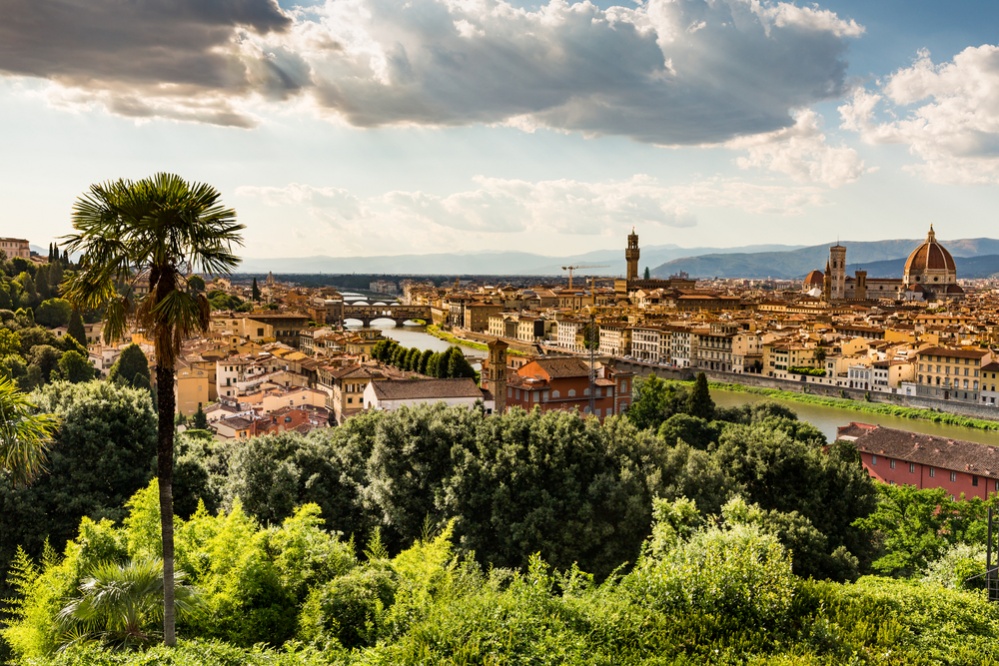I found myself alone in Florence, suitcase in hand, on one of the most fashionable streets in the city: Via della Vigna Nuova. I was 20. The white taxi had already sped off and I was gazing at two intimidating double wood doors wedged between store fronts boasting names like Gucci and Dolce and Gabbana. I searched for the last name of my soon-to-be Italian host family on the panel of fifty residents. I pressed the buzzer when I finally found their name and waited as vespas whizzed passed me and fashionable Florentines made their nightly passeggiata.
The doors buzzed open and I hurried into to a marble landing. I could hear the distant clopping of footsteps from several flights up, the sound growing closer and closer. Eventually, an elder gentleman appeared. “Suuzzzyyy!” he said, and quickly introduced himself, “Sono Mauro.” He embraced me with that European double kiss Americans are always awkward at accepting. Mauro would become my new Italian father for the next six months.
He ushered me upstairs where I met his wife Loriana, a shy yet warm woman. Their apartment, covered in antiques, looked straight out of a 1950s Italian film. I then met my roommate from California, who seemed equally as culture shocked as I was. Dinner was waiting for us in a kitchen the size of a shoebox. We broke bread in Italian as my brain throbbed from trying to use any of the phrases and vocabulary I had learned in my last two years of college. Few words came out that didn’t sound like garbled gibberish. I went to bed wondering how on earth I could do this for six months, live with a strange family and speak a language I clearly didn’t know as well as I thought I did.

Living with host families in foreign countries is just one of those language learning rites of passage. They say the only way to learn a language is to go where they speak it and immerse yourself with locals. I went to Florence, a city inundated with English speakers and shop owners who take one look at a pale redhead and seldom open with Italian — as if I might not know what ciao means so they must say hello instead. I needed to actually live with some Florentines who would force me to learn Italian — after all, it was all they could speak.
Every night, dinner turned into the hardest Italian lesson I’d ever taken. “Coniglio!” Mauro insisted when I asked what the mystery meat was before me. When he saw the puzzled look on my face, he uttered the only two English words I ever heard him say, “Roger Rabbit!”
I would stay up late chatting with Loriana who knew not a word of English. She would glow when talking about her son who lived in San Diego. The TV would blare in the background, always her soap opera, which perfectly guided our conversations without any awkward silences. I learned over those nightly chats that she’d grown up in Florence and had been a fashion designer. She pulled out books of her designs and beamed with joy detailing her remarkable past. I gaped in wonder about her life.

I would return home from class each day to Mauro and Loriana, who became like my Italian-speaking parents over those six months. And my improvement in speaking the language showcased that fact. By the end of it all, I wasn’t stammering to find the words to use, they just flowed from my mouth without thinking. While it took a bit of courage to go live with a strange family in Italy, it’s an experience I wouldn’t change for anything.
Are you thinking about living with a family in a foreign country to improve your language skills? There are a few things to remember.
The First Day Is the Hardest Part
As I sat in my antique twin bed in a room filled with rich furnishings, I felt loneliness. How would I get by speaking Italian for six months and living in a stranger’s home? I wanted to cry, mostly due to culture shock, and that night, I did. Maybe it was the jet lag, but the first day of living in a foreign country with a family that doesn’t speak your language is going to be the hardest part. You will think that you can’t do it, that you should have studied more. By the end of your time however, you will be laughing at that culture-shocked self on day one. Get through the first day and it’s all downhill from there.

Don’t Speak English (Seriously)
Even if your host family knows English, you have to stumble through in the language you came to learn. Luckily for me, my Italian host family knew very few words in English. While there were days where I didn’t want to speak Italian at dinner — my brain ached and I just wanted to get through the meal. But my Italian has never been better than when I left their apartment when the semester concluded.
Make Mistakes and Be Honest When You Don’t Understand the Language
I frequently butchered the language over meals with Mauro and Loriana. They never laughed at me or talked over me. Rather they worked with me to get the Italian words out. When I didn’t understand, I didn’t act like I knew what they were saying. They would use different words and phrases until I recognized the meaning. When you live with a host family in a foreign country and your sole purpose of being there is to try to learn a language, don’t be afraid to make mistakes. If they are willing to take in language students, then they are understanding people who will help you work through the language until you do understand.

You’ll Have a Second Family For Life
When I was sending out my wedding invitations years after I was 20 and living in Florence, I had to include Mauro and Loriana. I knew they wouldn’t make it, but they felt like family that should be included in one of my major life events. I received a long letter back, wishing they could come but letting me know that their son would be in the US during that time. They were even considering coming to Denver to attend my wedding, that’s how connected we became. Every year, I receive a Christmas card, hand drawn by Mauro, a professional artist. It is always the same image, Mauro’s caricature and Buon Natale scribbled in his handwriting. I smile and think of my Italian parents on Via della Vigna Nuova.

